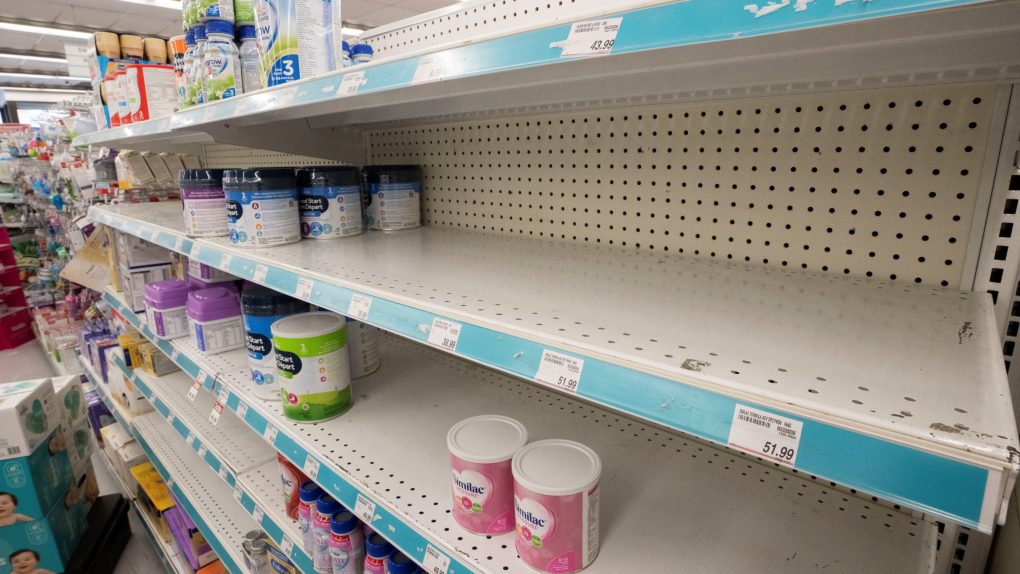Global Courant 2023-04-19 05:27:10
OTTAWA –
If baby food is akin to liquid gold this year for parents stressed about empty store shelves, Canada may be sitting on a potential treasure trove — if only it could handle the raw elements.
There is a surplus of the key infant formula ingredient, but with no processing capacity, dairy producers say much of it goes to waste or is sold cheaply as animal feed.
The material, called fat-free solids, is basically what’s left of raw cow’s milk after it’s been processed and the fat removed for use in other products like butter.
“Butterfat is in relatively higher demand than non-fat solids,” said Mathieu Frigon, the president of the Dairy Processors Association of Canada.
“You can’t say to a cow, ‘Produce only butterfat, but no fat-free solids.'”
As a result, about 19 percent of what is produced in Canada is considered surplus. It is either thrown away, sold to “low-value” markets as animal feed, or donated to food banks, the Canadian Dairy Commission said in a statement.
That problem has only gotten worse over the past five or six years, Frigon said, as demand for butterfat has risen and demand for the leftovers has not.
Canada has so much of it that the government has set aside $333 million in the 2023 federal budget to help the dairy industry figure out what to do with it.
Fat-free solids have traditionally been used to make low-fat milk, Greek yogurt, some cheeses, and things like protein powder. It is also the main ingredient in infant formula, which has been in short supply in Canada for over a year.
That shortage began when a plant in the United States that produced much of Canada’s baby food supply closed several months after a February 2022 product recall.
It reopened four months later, but is still not at full capacity.
There used to be plants in Canada, but over time they moved across the border. Now the country is completely dependent on imports to feed babies who are not breastfed.
Health Canada says that while there is an ample supply of regular formula in Canada, not all brands are available. Cheaper brands are particularly short.
To convert the extra fat-free solids into baby food, it must be specially processed to make it easy for small stomachs to digest.
Manufacturers are interested in making baby food in Canada again, but the Food, Health and Consumer Products of Canada says the rules here are so strict it’s hard to justify the investment.
“We have the ingredients we could use, but it’s really prohibitively expensive for a manufacturer to invest in Canada,” said Michi Furuya Chang, vice president of public policy and regulatory affairs for the industry group.
She said Health Canada takes a long time to approve formulas for distribution in Canada compared to the United States — in some cases it took more than four times as long.
“We advocate for an efficient, but of course risk-based, modernized regulatory system here in Canada to re-incentivize investment in manufacturing, bring it back domestically, and then help that industry grow, innovate and compete with the ingredients we have in abundance. here in Canada,” she said, adding that talks with the government have been very positive.
Federal Health Minister Jean-Yves Duclos says processing infant formula is an important goal to bolster Canada’s supply, but it won’t happen anytime soon.
“Setting up the factory that is safe and sound takes a lot of time, so we can’t wait that long for infant formula to be available in Canada,” Duclos said in an interview last week.
Canada Royal Milk has set up a plant to produce infant formula in Kingston, Ont. The company was founded by Feihe International, the largest producer of infant and young child formula in China.
The company applied for approval from Health Canada in the summer of 2022 and is still awaiting a response. The company has plans to export its products, but will focus on Canadian distribution first.
In the meantime, Health Canada is temporarily importing 70 different formula products from countries with high quality and manufacturing standards similar to Canada.
For its part, the Canadian Dairy Commission said the industry is making every effort to ensure that none of Canada’s dairy products go to waste.
Canada had shipped some fat-free solids to Mexico, said Tyler McCann, the general director of the Canadian Agri-Food Policy Institute. That changed when the new trade agreement between Canada, the United States and Mexico was signed.
“That market in Mexico that the Canadian exporters found is a market that (was) filled by the Americans, and the Americans didn’t like that we took that market away,” he said.
Similar limits also apply to bulk baby food exports, Frigon said, creating another barrier to domestic production.
He said the simple solution is to build processing plants to make infant formula, for example, but there is also an opportunity to develop entirely new products.
“There’s also a new space, especially when you get into health products, where you can take those proteins and those protein isolates and produce new, more innovative, value-added products,” he said.
The $333 million fund earmarked by the Liberals in the budget will be used to explore what else can be made with the leftover dairy materials over the next 10 years, to help develop processing capacity and to market the products on the market. to market.
This report from The Canadian Press was first published on April 18, 2023.
— With files from Camille Bains in Vancouver.








